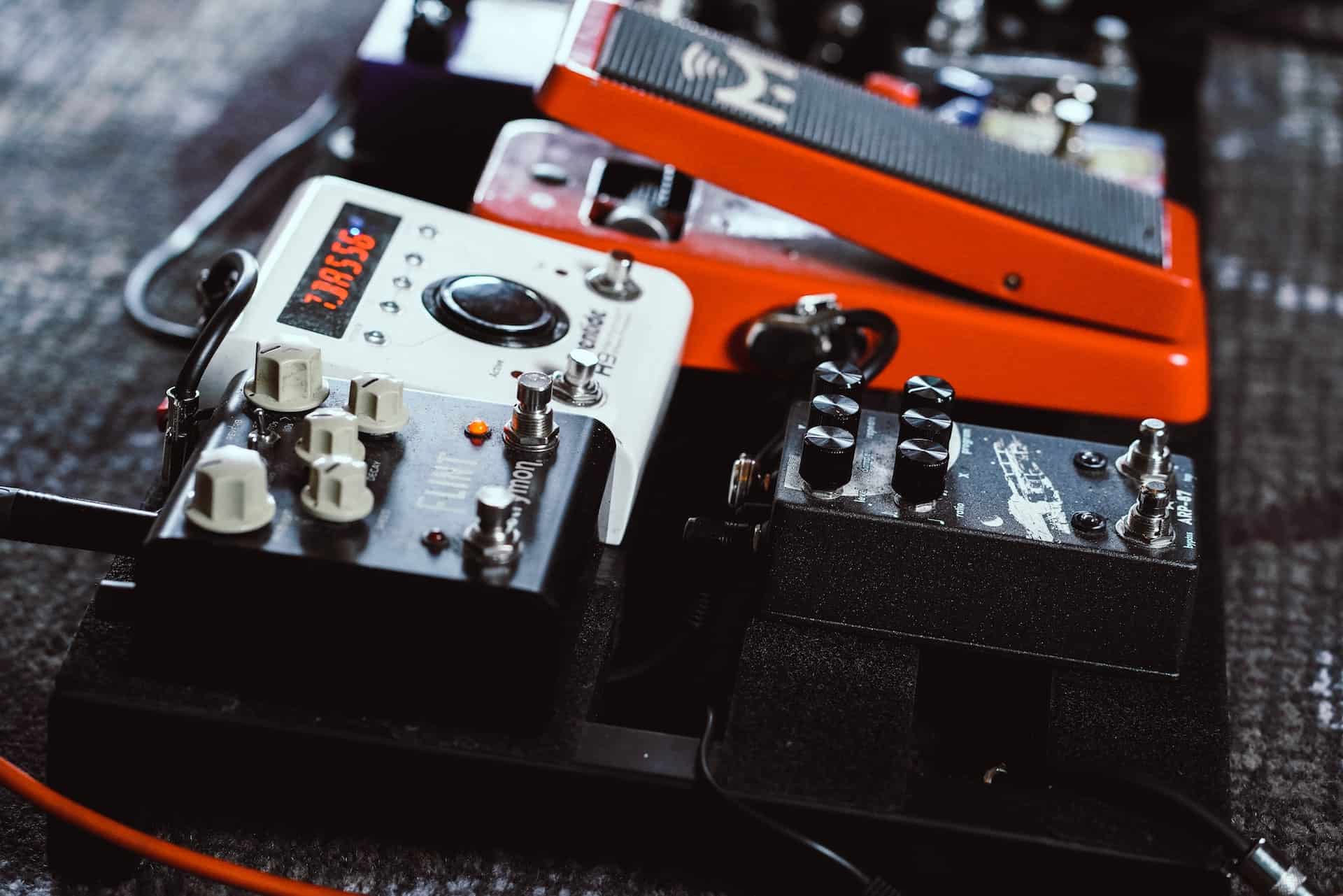I started playing electric guitar when I was a teenager. I didn’t know anything when I started. But as I progressed, I realized that the world of electric guitars was made up of many more elements than just guitars.
First, there are many different types of guitars from which you can choose the ideal model for you. But besides that, there is a lot of equipment and accessories with which to shape your sound. To get to know the electric guitar, you will have to explore and learn how to use two fundamental elements, such as guitar amplifiers and effect pedals. In the following article, I will help you answer: “What guitar pedals do I need to get the perfect sound?”.
The world of electric guitars, amps, and pedals can be as exciting as it is overwhelming. There are too many models and different types of effects that can help you to achieve your own sound. During this article, we will try to discover together, which are the essential pedals that every guitarist should know and which are those necessary to get to sound like a professional.
You could play your electric guitar alone with an amplifier, but that’s something tasteless. When you start playing electric guitar, you have in mind the sound you have heard in your favorite songs, made by professional musicians and bands, who surely use some pedals, effects, and sound processors. So it would be very naive to think that you can achieve a good sound or the sound you aspire to, without at least using some pedals.
There are a lot of pedals out there, but there are a few which are repeated on almost all of the most well-known guitarist’s pedalboards. I’m going to concentrate on some essential pedals to try to answer, “What guitar pedals do I need to get the perfect sound?”
Tuner pedals
When you are on stage playing for more than an hour, your guitar will go out of tune, and you need to be able to tune it most quickly and easily, that’s what these tuner pedals are made for. You can also use it as a muter to change guitars between different songs. We have already discussed tuner apps that you can use with a smartphone in another article. But a tuning pedal will give you precision and speed that is impossible to achieve with an app.
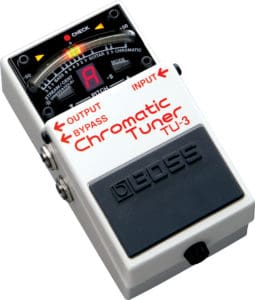
The Boss TU-3 is the most popular tuner pedal. It is a classic pedal and has a lot of parameters to change. The CPT-20 by Harley Benton is a more modern model, with true bypass connection and a large LCD screen. There is also the Mooer Baby Tuner, which is a little smaller and very practical to use. I recommend you to have the tuner pedal as the first one connected to your guitar. This way, you will be ensured to always be able to tune, even if you have to take out or add a pedal to your pedalboard in the middle of a show and make sure you are always in the right tone.
Overdrive pedals
Before the existence of overdrive or distortion pedals, the distortion sound was generated by playing between the preamp and the amp stage of a guitar amp. Today you have a wide range of overdrive or distortion pedals to achieve this effect more effectively. The overdrive sound is associated with the classic Rock and Blues, and you’ll notice it in many songs by players such as Hendrix or Clapton.
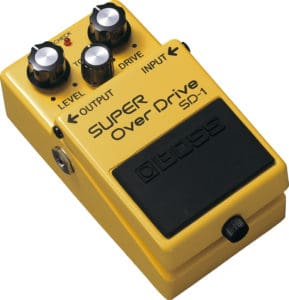
The SD-1 Super OverDrive is a popular choice for overdrive pedals. It will allow you to achieve a warm and natural distortion, and a perfect emulation to the sound of a supercharged tube amp. This pedal maintains the subtle nuance of the most commonly used technique for playing Rock and Blues. This is one of the most smooth OverDrive pedals for Blues and Rock.
Distortion pedals
It is very common to confuse the Overdrive and Distortion pedals, and many people can tell you that they are the same, but that is a mistake. They are different pedals, which produce a very different effect and sound from each other. Overdrive adds gain and texture to the natural sound of an electric guitar, emulating the saturation sound that can be produced with a valve amp. A Distortion pedal, on the other hand, distorts the signal wave of the electric guitar, producing a much deeper and audible effect.
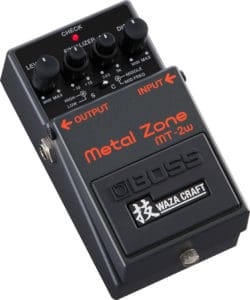
The Metal Zone MT-2W pedal is a classic Distortion pedal. It has been one of the most popular and influential compact pedals in the BOSS line for over 25 years. It has only been surpassed in sales by the venerable DS-1 Distortion. This pedal works with two modes: The standard mode offers a more modern version of the classic Metal sound, and the custom mode allows you to adjust more parameters and customize your sound to suit today’s high-gain styles.
Noise Gate pedals
Perhaps this is not a pedal that might seem important at first glance. But if you choose to play Hard Rock or Heavy Metal with high levels of distortion, a Noise Gate will help you achieve a much cleaner sound and will certainly save you some headaches. These pedals have very easy parameters to set. Of course, you have to find the optimal point based on your taste. This is one of those tasks where you have to try until you are satisfied with the result. Always looking for that ideal point where the noise disappears but without losing the classic sound of a distorted electric guitar.
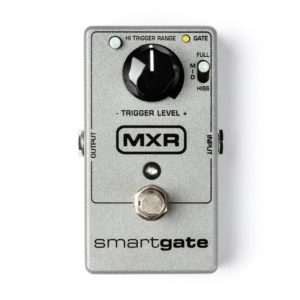
The Dunlop M135 SMART GATE is a classic Noise Gate pedal and the one that Slash has been using for a long time. It has three selectable types of noise reduction. It allows you to extract a clean sound with excellent sustain from every note and chord you play. The M135 has a cable bypass, a precise threshold trigger, and a very clean circuit.
Wah-Wah pedals
The sound produced by a Wah-Wah pedal is an effect popularized by great guitarists like Hendrix, Clapton, Slash, Van Halen, and many more. This is almost the only pedal where moving your foot will graduate the effect provided, as it has a potentiometer that moves and varies the intensity of the effect while you rise or drop your feet. This pedal works with a high and low-frequency filter that produces that very characteristic sound similar to a human voice.
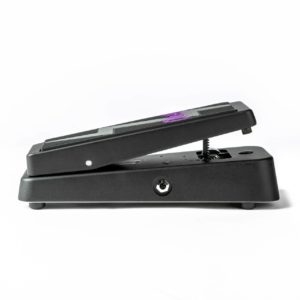
Nowadays, there are many models, but the most classic and the original is the Dunlop Cry Baby. This model has the famous “Q” Control, which varies the intensity of the wah effect by adjusting the shape of the effect. It’s a very versatile effect pedal that delivers a pure and strong sound.
Chorus, Delay, Compressor and Equalizer pedals
There is a wide range of pedals that provide different types of effects to achieve a dynamic and versatile sound with an electric guitar. The Chorus effect enriches the signal by copying it many times, coloring the copied signals, and reproducing them with a slight delay. It sounds as if several guitars were playing the same piece.
The Delay effect provides a multiplication and modulated delay of the guitar sound signal. Once the signal is processed, it is mixed with the original. The result is the classic sound with an echo effect.
The Compressor effect is used to make the dynamic range of the signal more similar. This means that all guitar signals sound the same, regardless of the strength we are playing with. The volume of the more powerful played notes goes down, and the volume of the less powerful played ones goes up so that the sound is more even.
An Equalizer pedal processes audio signals, modifying the frequency content of the signal it processes. It is necessary to take into account that the equalizers of the amplifiers are usually passive, and the equalizers of the pedals are active. So the pedals have more advantages because they work over a wide range of frequencies by attenuating or magnifying frequencies, while the amps only cut or attenuate certain frequencies. You don’t have complete control over the entire frequency spectrum.
What guitar pedals do I need to get the perfect sound?
As you can see, there are a lot of effect pedals out there. The pedals you need will be based on what style of music you play and what sound you want to produce. In this article, I have left you a few clues to answer, “What guitar pedals do I need to get the perfect sound?” for yourself. I tell you that in my case, as I like to play Hard Rock, the pedals that I have always used are Tuner, Distortion, Noise Gate, Wah-Wah, Delay, and Equalizer. I hope you liked this article and that it helped you in your search for your perfect sound.

